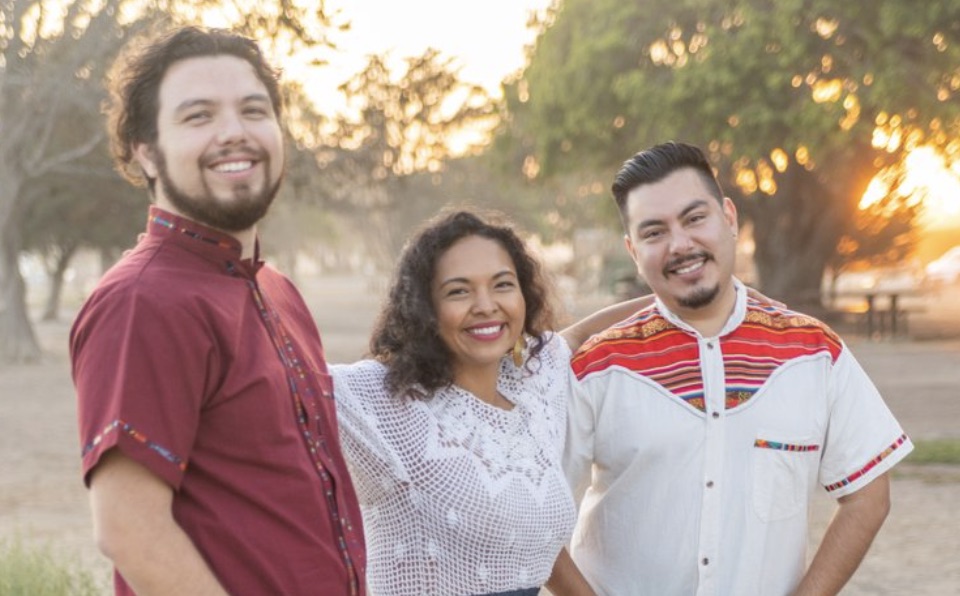Since Bienestar Latinx launched earlier this year, one thing has become very clear: There is a strong desire for culturally relevant, holistic health care for Santa Barbara Latinxs.
This isn’t news to local therapist and Latinx mental-health advocate Ali Cortes. She observed a particular need for Spanish-language outreach and resources while assisting community organizations at the height of the COVID-19 pandemic.
People needed basic information about financial assistance and how to stay virus-free beyond pamphlets and flyers, Cortes said, as well as a safe alternative to in-person meetings. The community was also hungry for mental-health assistance and a supportive space to express their emotions, fears, and goals.
Bienestar Latinx creators Ignacio Moreno, Ali Cortes, and René García-Hernández | Credit: Jessany Hope Photography
Cortes seized the opportunity to connect people to the right services. “Even though I’m really shy, I started doing [Facebook and Instagram] lives,” she said.
The bilingual “broadcasts,” as Cortes calls them, ran the gamut. When alcohol sales spiked during the stay-at-home orders, for instance, she hosted an educational session encouraging alcohol alternatives, such as kombucha or sparkling water. When money pressures grew, she brought in financial coaches.
Whatever the topic, Cortes facilitated conversations with residents about the challenges they were facing and hosted meditations and workshops on psychology, stress management, and breath work. The broadcast viewership and participation increased, and Bienestar Latinx was born. The organization, whose name translates to “Latinx well-being,” is fiscally sponsored through the Santa Barbara Response Network.
Part of fulfilling their mission means “addressing the stigma of mental illness” in Latinx communities, Cortes said. She herself was diagnosed with depression and anxiety as a child and is very familiar with the shame often felt around seeking mental-health support. “[Bienestar Latinx is] promoting the concept that it’s okay to get help,” she said, “and we need it.”
The team believes true generational healing can be achieved with a holistic ― and fun ― approach, as well as decolonizing health and educational systems. It’s deconstructing limiting ideas around identity and self-worth and celebrating the nuances of culture and history. Cortes and the organization’s other cofounders, René García-Hernández and Ignacio Moreno — all first-generation Mexican Americans — reflect this well-rounded approach.
Cortes is a seasoned mental-health practitioner with a master’s degree in clinical psychology, while García-Hernández — who grew up in Santa Barbara — holds a master’s in education and works for a local nonprofit advocating for liberated education, racial equity, and social justice. Moreno, raised in Santa Maria, is an experienced content producer who has worked on local projects, including the Ortega Park mural preservation effort.
For García-Hernández, growing up “DACAmented, queer, and brown” meant he wasn’t “reflected in textbooks or the stores I read.” Throughout his life, he’s been empowered through storytelling and has led Bienestar Latinx’s “Relatos con René” broadcasts. “We learn from storytelling, and it’s one of the ways that we survive,” he said.
Sign up for Indy Today to receive fresh news from Independent.com, in your inbox, every morning.
Moreno is particularly passionate about building community with other Latinxs, especially those who have roots in other countries and have struggled with feeling that they are “de aquí y de allá” — “from here and from there.” In elementary school, his non-Latinx teacher shortened Moreno’s name to “Nash” since he couldn’t pronounce his given name, Ignacio. That experience stuck with him.
“You can feel alienated and like no one else is going through [being a first-generation student],” he said, “so I appreciate that aspect of telling our stories and sharing them … that it’s okay to be first-generation and growing up and figuring it all out.”
Thousands have tuned in to the Bienestar Latinx broadcasts, including people in Latin America. Numerous Santa Barbara neighbors have reached out with stories of how the virtual events have inspired them. “We’ve seen a heightened awareness now of taking care of yourself first and foremost before taking care of others,” García-Hernández said.
People have asked for help finding therapists and petitioning for more school counselors, he said. A group of Eastside señoras who have consistently tuned in have incorporated twice-weekly group beach walks into their routines and reported improvements in their overall state of being, and that of their families, as a result.
“We’ve heard people have left toxic relationships, and others have told us, ‘I applied to my dream job and got it!’ because we’ve discussed manifestation and vision boards,” Cortes said. “And people have even started meditating — including my suegros [in-laws]!”
After wrapping up its first slate of programming, Bienestar Latinx launched its “second season” on September 15, honoring the start of Hispanic Heritage Month. Their social media pages detail the coming guests and topics for their broadcasts, which will tackle everything from hair care to financial wellness to cultural pride.
For this next phase, the team plans to expand its network of therapists and health-care providers; continue the live broadcasts on Facebook, Instagram, and YouTube; and begin offering life-coaching sessions and youth mentorship.
“This is about celebrating our survival, yes,” Cortes said. “And now we’re also healing for the next generation.”
Support the Santa Barbara Independent through a long-term or a single contribution.

